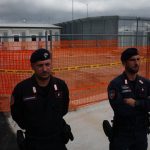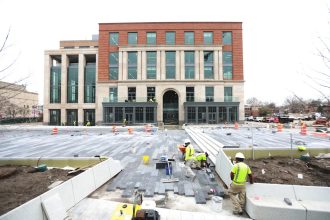Military authorities at the Jaji Military Cantonment in Kaduna State have announced the dismantling of drug cartels and the arrest of suspected drug dealers operating in communities within the cantonment’s jurisdiction.
The suspects have been handed over to the National Drug Law Enforcement Agency for further investigation.
The military also dismissed as false reports that it had demolished civilian properties within the area, describing such claims as a smear campaign against the institution.
The Acting Deputy Director of Army Public Relations at the Infantry Corps Centre, Captain Olusegun Abidoye, disclosed this on Saturday during a press briefing and guided tour for journalists to the affected areas.
Speaking on behalf of the cantonment, Abidoye expressed deep concern over the rising rate of social vices, particularly drug trafficking and substance abuse, in communities around the military base.
“These include Railway Settlement, Unguwan Loya, Unguwan Aboki, Unguwan Alhaji, and Unguwan Alasan, among other hamlets.
“While these communities provide informal support services to the cantonment, they also pose significant security and social risks.
“Some of the areas occupied by these settlements overlap with zones designated for training, exposing both residents and military personnel to physical danger during field exercises involving live ammunition,” he said.
Abidoye said intelligence reports and internal assessments revealed the presence of organised drug cartels operating within these settlements.
He warned that the activities of these groups have contributed to an alarming rise in substance abuse cases involving both soldiers’ children and civilians.
He said the military conducted investigations and field surveillance that confirmed the existence of extensive drug networks, particularly within Railway Settlement and Unguwan Loya.
“These cartels are reportedly operated by over 15 identified individuals involved in the trafficking, sale, and distribution of illegal drugs within and outside the cantonment.
“Some of the common substances trafficked include Indian hemp, skunk, Exol, ice (crystal meth), crack cocaine, tramadol, and other psychotropic drugs,” he said.
Abidoye said the arrest of cartel members is part of ongoing efforts to curb drug abuse and secure the cantonment and its surroundings.
On the allegations by some online media platforms that the military had demolished civilian properties, Abidoye said the claims were entirely false and intended to tarnish the image of the military.
“The disputed land is currently the subject of litigation, and the cantonment has been strictly complying with the court order to maintain the status quo,” he explained.
According to him, it was the plaintiffs who violated the court order by erecting new buildings and permitting a construction company to excavate laterite from the land.
He said the cantonment responded by filing an interlocutory injunction to restrain the plaintiffs and the construction company from further excavation until the legal case is resolved.
Abidoye also clarified that some businesses had been relocated to a centralised market for better surveillance and improved security.
On the reported disconnection of electricity to certain communities, he stated that the military had no involvement in the matter.
The News Agency of Nigeria reports that the Jaji Military Cantonment is a strategic hub for the Nigerian Armed Forces, hosting several prestigious institutions, including: Armed Forces Command and Staff College, Headquarters, Infantry Corps Centre, Martin Luther Agwai International Leadership and Peacekeeping Centre, Warrant Officers’ Academy, Nigerian Army School of Infantry, 4 Demonstration Battalion,601 Aviation Battalion.
Abidoye alleged that some members of the surrounding communities refused to vacate military land because they used the area as a cover for illegal businesses and criminal activities.
“The cantonment will continue to protect all law-abiding citizens within and around it,” Abidoye said.
NAN









